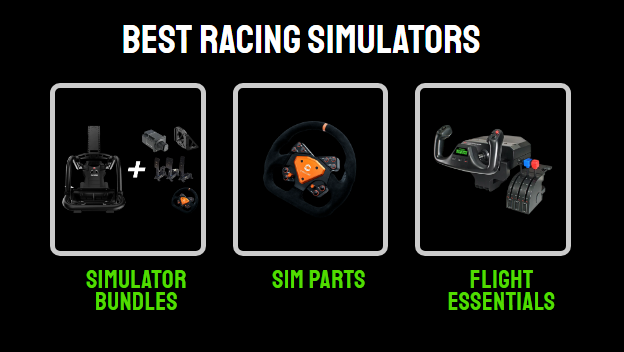GAMING
How Racing Simulators are Changing the Gaming Landscape

The world of virtual racing has rapidly evolved, with racing simulators taking the gaming experience to unprecedented heights. No longer are they just simplistic arcade games; Plus Gaming racing sims now offer incredibly realistic driving experiences, challenging even the most seasoned gamers and motorsport enthusiasts. This state-of-the-art gaming genre is redefining the boundaries between the virtual and real world of racing.
The Shift Towards Ultra-Realism
In recent years, racing simulators have seen a shift toward ultra-realism. These simulators are now designed to replicate the intricacies of real-world driving, including physics engines that emulate the handling and response of actual cars. Players can feel the grip of the tyres, the torque of the engine, and even the impact of weather conditions on driving performance.
Companies like Plus Gaming are at the forefront of this change, offering racing sim setups that cater to those seeking a genuine driving experience. It opens up opportunities for gamers to test their skills in a virtual environment that closely mirrors the thrill of a real racetrack.
Accessibility and Affordability
One of the most significant aspects of racing simulators is their accessibility. With the introduction of various price points, racing sims are no longer exclusive to a niche market. Enthusiasts with different budgets can purchase equipment that suits their needs, from entry-level wheels and pedals to full motion rigs that mimic the movement of a car.
Moreover, the availability of gaming pcs has made high-quality sim racing more attainable. Gamers can now easily find a gaming PC capable of running complex simulations without breaking the bank, further broadening the appeal of sim racing.
Training and Professional Development
Racing simulators have also gained recognition as valuable tools for professional racing drivers. They use these sims to practise and develop their skills, familiarise with race tracks, and test car setups. This crossover is a testament to the level of detail and realism that modern simulators can achieve.
It’s not just professionals who are benefiting. Aspiring drivers can use these simulators as a stepping stone to learn racing techniques. This democratisation of racing knowledge builds a bridge between virtual gaming and actual track racing.
Racing Simulators as eSports
Sim racing has become a cornerstone of eSports, with dedicated tournaments being broadcast worldwide. This competitive platform makes professional gaming a viable career option. Skilled sim racers can become sponsored drivers, joining teams and competing for substantial prize money.
At the heart of this eSports revolution are platforms like Plus Gaming, where racing sims have evolved into more than just games; they’re a legitimate competitive sport.
Community and Collaboration
One of the byproducts of the racing simulator surge is the community that has grown around it. Online forums, social media groups, and virtual racing clubs bring together enthusiasts from across the globe to share tips, organise events, and engage in racer-to-racer collaboration.
These communities also cross-pollinate with real-world racing communities, blurring the lines between gamers and racers. It’s a symbiotic relationship where experiences and knowledge are exchanged freely, enhancing both the virtual and real racing realms.
Inclusion and Diversity within Sim Racing
Racing simulators have also played a role in promoting inclusion and diversity within the world of motor racing. People from all walks of life, regardless of physical ability, can compete on an equal footing in the virtual world. This openness could potentially shape a more inclusive future for the motorsport industry.
Cutting-Edge Technology and Innovation
The desire for authenticity has driven technological advancement in racing simulators. From VR headsets to 4D motion platforms, racing sims are incorporating cutting-edge technologies that once seemed like the stuff of science fiction.
This relentless innovation keeps the genre fresh and continuously attracts new players seeking the next level of gaming experience.
Impact on Game Development and Design
As demand for more realistic racing sims grows, game developers are responding accordingly. Racing game design is now a sophisticated process involving input from engineers, professional racists, and gamers alike. This collaborative effort ensures that even the most minute details are captured, from the sound of the engine to the wear of the tyres on different surfaces.
The Future of Racing Simulators
The future of racing simulators looks incredibly promising, with technology and user experience at its core. As AI and machine learning become more sophisticated, we may see even more personalised and immersive experiences.
As we look to the horizon, it’s clear that racing sims will continue to influence and shape the gaming landscape in ways we’re just beginning to understand. From training aids to eSports, platforms like Plus Gaming are paving the way for an exciting future in virtual racing.
Conclusion
Racing simulators have come a long way from the coin-operated arcade machines of the past. They are now sophisticated, intricate systems that offer experiences nearly indistinguishable from actual driving. With global communities, involvement in professional training, and their stature within eSports, racing sims have indeed revolutionised the gaming landscape.
Whether it’s through the ultra-realistic simulators offered by Plus Gaming, or through the latest technology in gaming PCs in Australia, the world of racing simulations has become a key part of the digital and racing ecosystems, and its influence is only set to grow stronger.
For motorsport enthusiasts and gamers alike, the track is clear, and the race is on to push the limits of what’s possible within the realm of racing simulators.
Stay ahead of the curve with the freshest news updates by exploring TodayFirstMagazine!






